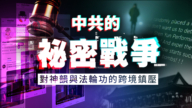【新唐人2011年3月21日讯】在中国大陆发生的“抢盐潮”, 一直到20号,才慢慢平息下来。紧接着,上海、北京 和南京等城市出现了“退盐潮”,但商家拒不退货。分析认为,“抢盐潮”除了暴露中共政府的公信力危机外,很多深层原因更值得探究。
从3月16号起,中国各地突然爆发市民争先恐后抢购食盐的 “盛况”,大量超市的食盐都销售一空了。
据报导,广东过去两天食盐销量,相当于平时一个月。而全中国17号一天的盐销量,相当于平时24天的销量。民众在抢光食盐后,甚至连酱油、咸菜也一抢而空,就连微博上很多人的问候语都变成了“你买盐了吗”?南京有名女子对着每包8元抢购来的50包盐,欲哭无泪,说一家三口要吃4年。
反观日本人历经9级地震、特大海啸和核危机,所表现出来的冷静和秩序井然,大陆民众的表现有网友开玩笑说,日本人看到中国抢盐的镜头,本来凝重的脸庞也会失笑,也许会问:“究竟是哪里发生天灾了。”
是中国人疯了吗?是中国人愚昧吗?还是有更深层的原因呢?网路媒体、各界人士对荒唐的“抢盐潮”的现象也在热议。
大陆资深媒体人长平认为,光说愚民,有点太表面化了。
长平:“因为大家长期对社会的管理系统缺乏信任,只好自救,而自救又没有别的办法,于是就在恐慌中慌不择路。这就是我们整个的社会体系、救援体系和政府发布资讯的权威性等一直以来没有建立,甚至这些年来有所拆毁。所以民众基本不相信政府、或者以政府为主建立的社会体系。”
英国《金融时报》石述思的文章认为,“抢盐潮”除了暴露中共政府的公信力危机外,很多深层原因更值得探究。
石述思认为,在中国这个转型社会,情感缺失,信仰迷失,价值混乱,制度滞后,利益分割,于是大难临头,难免人人自危,各自为“战”。他认为,这是公众焦虑感和缺乏安全感的一次集体释放,是整个社会诚信体系崩塌结出的恶之花。
实际上,这并非中国第一次陷入如此恐慌。2003年SARS爆发时,人们大肆抢购板蓝根、84消毒液和口罩的情景,至今仍让人记忆犹新。
《金融时报》另一篇文章《哄抢碘盐的背后》直接指出,中国的管理层应该要透过“盐慌”去认清当前的社会问题,采取措施,重构社会的信任,重构公共治理的效率模式,是更为重要的话题。
在抢盐风潮初起时,中共官方以及所谓的“砖家”们出来辟谣说:‘加碘盐大家不必抢,我国的食盐供应很充足,大家不必惊慌’。署名李光的文章质问,为什么官方刚辟谣完毕,结果超市里的加碘盐被抢购一空呢?
李光表示,所谓哀莫大于心死,当普罗大众面对当局一次次的“食盐”(食言),已经失去了耐心,那么到时,政府便成了中国最大最孤立的钉子户了。难道“大人们”不惧怕强拆的威力吗?
新唐人记者李静、李璐综合报导。
Salt Rush‘s Mistrust in CCP
The‘salt rush’in China has finally calmed down,
and a wave of ‘salt returns’
followed in major cities.
Salt returns are refused by merchants,
and many believe that the ‘salt rush’ reveals
people’s lack of trust in the CCP‘s regime.
Starting March 16, panicked Chinese people
rushed into stores to purchase salt.
The frantic buying has left grocery shelves empty
of salt throughout China.
In Guangdong, a month’s supply of salt was sold out
in 2 days; and on March 17, 24 days supply of salt
was sold out in just 1 day nationwide.
Buyers even raided shelves for soy sauce
and preserved vegetables.
People‘s greeting was “Did you buy salt?”
A woman in Nanjing said that she purchased
50 bags of salt at 8 RMB per bag,
which would last her entire family 4 years.
Looking back, the Japanese faced
the earthquake, tsunami and nuclear crisis
with calm and order, in contrast to the frantic
behavior of the Chinese. Some are joking
that if the Japanese see the ‘salt rush’ in China,
they would ask, “Where did the disaster strike?”
Are the Chinese people absurd? Or ignorant?
Or there are deeper causes behind this behavior?
The ‘salt rush’ fueled discussion throughout China.
Senior journalist, Chang Ping, believes that
it too superficial to blame the people.
“People have to try saving themselves because
they have long lost trust in their society.
They had no other choice but to panic.
The society does not have a notification system
or rescue structure to cope with disasters,
so the people do not trust the government,
nor the society built around this government.”
According to a Financial Times article by Shi Shusi,
the ‘salt rush’ reflects many deeper issues.
“The Chinese society has lost its faith and values;
social policies are outdated,
and the distribution of wealth is a messy disaster.
Everyone worries for himself.
The ‘salt rush’ is a release of public anxiety,
a result of the collapse of social trust.”
In fact, this was not the first panic to hit China.
Similar crisis occurred during the outbreak
of SARS in 2003, when Chinese people rushed
to buy Radix Isatidis, bleach, and masks.
Another Financial Times article pointed out that
Chinese authorities must see the social problems
in China behind the ‘salt rush’, and take actions
to rebuild trust and order in society.
At the beginning of the ‘salt rush’, the CCP had its
“experts” speak to the public that “there is no need
to rush and buy salt. Our country has sufficient salt
supply so there is no need to panic.”
An article by Li Guang asks: “Why were
stores‘ shelves emptied of salt the very next day?”
Li Guang believes that despair is the greatest
sorrow. After countless disappointments,
the people have lost faith in their government.
Aren‘t the officials afraid of this public’s power?
NTD reporters Li Jing and Li Lu.




























